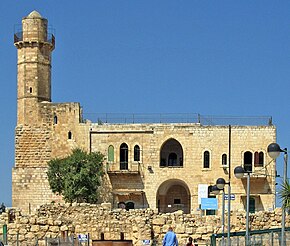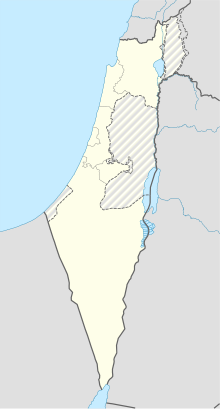Nebi Samuel

Nabi Samwil mosque built on remains of Crusader-era fortress, the Tomb of Samuel is in a crypt below the Mameluke building.
|
|
| Coordinates | 31°49′59″N 35°10′54″E / 31.832978°N 35.181633°E |
|---|---|
The Tomb of Samuel Hebrew: קבר שמואל הנביא, translit. Kever Shmuel ha-Nevi; Arabic: النبي صموئيل, translit. an-Nabi Samu'il or Nebi Samwil), is the traditional burial site of the biblical Hebrew and Islamic prophet Samuel, atop a steep hill at an elevation of 908 meters above sea level. It is situated in the Palestinian village of Nabi Samwil in the West Bank, 1.3 kilometers north of the Jerusalem neighborhood of Ramot. On the site is a building containing a mosque built in the 18th century that was formerly a church. The tomb itself is located in an underground chamber where a small synagogue is located. The Israeli Ministry of Tourism website states "Over time practically every ancient Jewish traveler mentioned the place and its synagogue."
It is currently located in the Seam Zone, effectively annexed in an enclave by the Israeli West Bank barrier together with the Israeli settlement of Giv'at Ze'ev.
Yitzhak Magen conducted archaeological excavations from 1992–2003. On the southeastern slope is a 4-acre (16,000 m2) urban settlement dating back to the 8th-7th centuries BCE, and remnants that Magen believed to be the Mizpah in Benjamin of the Book of Samuel. By contrast, Jeffrey Zorn concluded that there are no remains at the site, from the period in which the Samuel narratives are set, and it could therefore not be Mizpah. Magen's own conclusions have been criticised for stretching the evidence beyond the obvious implications, which he himself hints at:
...
Wikipedia

